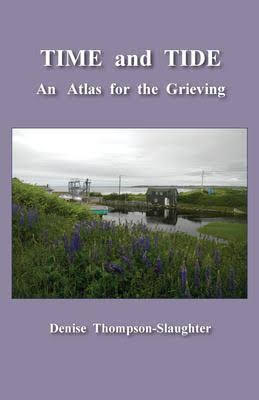
Time and Tide: An Atlas for the Grieving
by Denise Thompson-Slaughter
21 poems ~ 32 pages
Price: $10.00
Publisher: Plain View Press
ISBN: 978-1-63210-087-0
To Order: Amazon.com or plainviewpress.com.
Reviewed by Michael Escoubas
One reason I am so glad to be a book reviewer is that I’m allowed entry into the consciousness of so many fine poets. Poets are vulnerable people. They risk everything to respond to the world in which they live. The burdens of life rest heavily upon the shoulders of artists, composers, novelists, and poets. Friedrich Nietzsche once wrote, “No one can build a bridge on which you, and only you, must cross the river of life.” I agree with Nietzsche that there are some things in life that one must do alone. No question about that. However, I disagree with Nietzsche because, it often falls to artists to build the bridges over which the burdened may find passage through the hard experiences of life. This is what I find seated deeply within the consciousness of Denise Thompson-Slaughter.
In Time and Tide: An Atlas for the Grieving, Thompson-Slaughter, identifies with the hearts of the grieving. She dedicates this slim but pregnant volume to the “Grieving, with special thanks to the medical personnel and first responders during the Covid-19 Pandemic.” However, lest the reader think that Time and Tide is just one more treatment in a long procession of other writings on the same subject, I hasten to point out that the poet brings her own unique take on suffering. She does not confine her poetry to just one theme. Time and Tide is an Atlas. While an atlas usually contains charts, maps and statistics, Thompson-Slaughter charts the minds and hearts of those who grieve. Her maps take on human form as she explores what people go through at ground zero of their loss.
A good place to begin in understanding Thompson-Slaughter’s approach is showcased in two haiku which provide context:
Pandemic Haiku
(1)
Amid spring flowers,
unattended funerals.
Mourners go unhugged.
(2)
We all brim with tears,
each mourning cumulative,
past losses relived.
The poet sees two notable features of the pandemic and of our lives:
Life continues, spring flowers display their colors and fragrances. But for many there has been a profound disconnect. Those all-important end-of-life touches, the gentle exchanges of last-looks denied, have left a “mourning cumulative, / past losses relived.
“The Answers Are at the End,” addresses a timeless question: Is God indifferent to our suffering? Many times I have wondered the same thing. All I want is a good reason, any reason that makes the sum of 1 + 1 = 2. To her credit, Thompson-Slaughter will have nothing to do with easy answers.
The Answers Are at the End
We humans like meaning with our meaty lives.
We see patterns in the carpet,
faces in the knotty pine,
project pictures on the starry sky.
We’re always connecting the dots.
We ask why, why, why
until any god who exists
must tire of our whining and our
tiresome toddler questions.
Is the universe deaf and indifferent, or
are we simply too small to understand the answers?
Without trying to solve impossible questions, the poet does something much better. She builds a poetic bridge:
Mourning Tote
Mourning comes, the darkness stays.
We think of all the thousand ways
we’re fragile and prone to mistake,
while others we for granted take.
We counted on those who cut our hair,
who made us smile, who loved to share,
who treated our pets and our maladies
in better times, by far, than these.
We dream of those whom we have lost
and watch the rose poke through the frost.
The year advances as it will,
but we tote up our losses still.
I mentioned earlier that Thompson-Slaughter does not confine herself to one theme. While the bulk of her collection is about Covid, it is really about the dynamics of loss no matter the specific form loss may take. Her interests propound on the loss of Supreme Court Justice Ruth Bader Ginsberg, as well as several events involving loss due to social injustice, as well as very real concerns about the direction our country should take moving forward.
Yes friends, Time and Tide: An Atlas for the Grieving, will repay you many times over, with remarkable poems that may help you build your bridge over the river of life.
|


